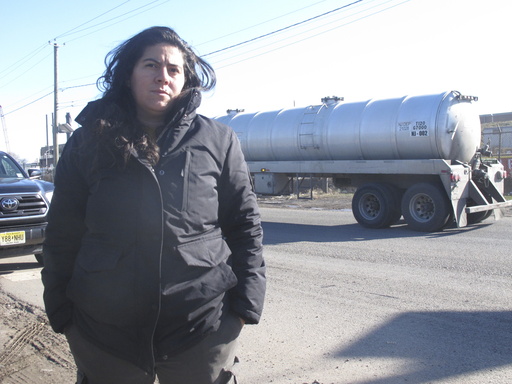New Jersey environmental justice law won’t block power plant hotly fought by Newark residents

NEWARK, N.J. (AP) — For nearly four years, residents of Newark’s Ironbound section, a gritty, industrial neighborhood near an airport and surrounded by train tracks and many smelly sources of air pollution, had hoped an environmental justice law aimed at protecting communities like theirs would block construction of yet another gas-fired power plant.
On Thursday, those hopes were crushed when New Jersey allowed the permitting process for a new facility to move forward. The Passaic Valley Sewerage Commission says the $180 million backup power project is needed to prevent another power failure like the one from Superstorm Sandy in 2012 that allowed 840 million gallons of raw sewage to flow into New York and New Jersey waterways.
The New Jersey Department of Environmental Protection’s decision was the first of its kind since 2020, when Democratic Gov. Phil Murphy signed the state’s environmental justice law with great fanfare. Although it is not the final step in the approval process, it represented a major hurdle for the project — and a major disappointment for neighborhood residents.
The new power project is designed to kick in during severe storms, power outages or cyber attack. Officials from the existing plant, the sixth largest out of 16,000 in the nation, say the backup power source will be a critical safeguard against raw sewage entering waterways, or even city streets, during a power outage.
For Ironbound, a neighborhood populated mostly by people of color, opponents say it’s yet another sign officials think it’s OK to make their community a dumping ground for undesirable projects.
“This is a shameful, racist compromise on behalf of the Murphy administration,” said Maria Lopez-Nunez, a deputy director of the Ironbound Community Corp., one of the loudest voices against the project.
“Once again Black and brown communities are shown that we will be sacrificed for the ‘greater good,’” she said. “Approving dinosaur technology under the guise of protecting the environment is perverse, and doesn’t do anything to help heal the lack of public trust in agencies that are meant to protect us.”
Anticipating such reactions, Shawn LaTourette, the state’s environmental protection commissioner, said his department will require the new facility to use solar panels and battery storage to ensure a net decrease in pollution.
That means the sewage commission will have to install 5 megawatts of solar panels, 5 megawatts of battery storage, additional pollution equipment on sludge treatment boilers, and remove and upgrade older equipment including boilers and generators, LaTourette said.
A spokesman for the commission said it is reviewing the decision and noted the project still needs to receive a formal permit before work can begin.
Thursday’s decision tries to thread the needle between two of New Jersey’s big priorities: protecting the environment, and keeping certain communities from being overburdened with pollution, particularly those where a majority of the population is made up of people of color. That second goal is part of an environmental justice movement taking aim at such projects nationwide.
LaTourette said the backup plant will only operate during emergencies involving loss of electricity to the site and once a month for testing and maintenance.
“If there is an outage, we want the sewage treatment plant to run,” he said. “When there’s a power outage, we don’t stop flushing our toilets.”
But Ironbound residents say they already endure more than their fair share of pollution; this would be the fifth power plant to operate in their community.
Matthew Smith, director of the Food & Water Watch environmental group, said the decision “betrays the governor’s promise of clean air for all New Jerseyans.”
“Today’s decision proves that First Lady Tammy Murphy’s stated opposition to the project earlier this year was a thinly veiled ploy to dupe voters into thinking this administration cares about their health and futures,” he said. “Governor Murphy must immediately reverse course and deny this project or watch his green credentials go up in smoke.”
Tammy Murphy opposed the planned facility during her brief stint as a candidate for a U.S. Senate seat earlier this year.
The backup power plant originally was proposed to run solely on natural gas, which residents say would worsen already poor air quality in the neighborhood. On a recent visit to the site, the stench of sewage hung heavy in the air near giant outdoor treatment tanks. Residents say the smell often travels for miles.
The commission modified the plan to incorporate solar power with burning natural gas. The plan calls for replacing the natural gas component entirely if and when technology advances make it feasible.
___
Follow Wayne Parry on X at www.twitter.com/WayneParryAC
Copyright 2024 The Associated Press. All rights reserved. This material may not be published, broadcast, rewritten or redistributed without permission.


